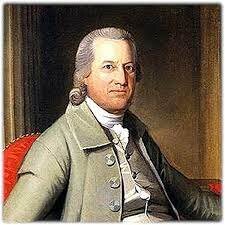
Oliver Wolcott
Connecticut
Oliver Wolcott, on November 20, 1726, was born into a family of heritage and influence. To this point, Roger Wolcott, his father, was the royal governor of Connecticut. He was reelected to the post annually for three, successive years. This is just an example of the civic involvement and influence the Wolcott family carried on from generations past. His upbringing shaped him to be a man of admirable character and rooted in the Christian faith. Upon graduating from Yale College, he received a militia captaincy and fought in King George’s War (1740-48).
He would continue to be involved in the militia before the Revolutionary War and during it. His dedication and valuable leadership garnered several promotions from captain to major to colonel to major general. After King George’s War, he studied medicine with his brother, but soon decided a profession in law was more to his liking.
Oliver Wolcott moved to the town of Litchfield and immediately began public service as the county sheriff. In time, he was elected a member of both the lower and the upper houses of the Connecticut General Assembly. He also served in a couple of judgeships. He served in the Continental Congress from 1775 to 1783. He was absent for a spell due to sickness. This happened to take place in June of 1776. He missed the vote for independence on July 2nd and the approval of the Declaration on July 4th. He would return in October and add his name to the historical document.
Oliver Wolcott would return to the militia for the New York campaigns of 1776-77. Brig. Gen. Wolcott would help lead the Continental Army in defeating Gen. John Burgoyne. In 1779, Brig. Gen. Wolcott defended the Connecticut seacoast against the advances of New York royal governor, William Tryon.
While Brig. Gen. Wolcott was in New York City, a notable incident of patriotism took place in 1776. Shortly after the approval of the Declaration a copy was sent to Gen. Washington. He had it read aloud to his soldiers and the colonists. The public reading spurred a patriotic enthusiasm that led to some members of the Sons of Liberty and some soldiers to tear down the oft-derided equestrian statue of King George III in Bowling Green. Then, the lead statue was cut into pieces with the head being severed from the rest of the body.
The colonists intended to display the “king’s head”, as a criminal’s would be, on a spike above Fort Washington. Those plans were foiled when loyalists stole the head from a tavern where it was being stored. Captain John Montressor shipped it to England for safe keeping. The rest of the statue was shipped to the Brig. Gen. Wolcott’s home where the lead was melted and formed into over 42,000 musket balls.
In 1775, Oliver Wolcott was appointed Commissioner of Indian Affairs for the northern department. He worked on obtaining the neutrality of the Iroquois nation. After the war ended, he helped negotiate two Indian treaties, one with the Iroquois tribe and another with the Wyandotte tribe. Both of these treaties yielded significant acres of land to the U.S. government. He also served as representative in the upper house of the Connecticut legislature and was lieutenant governor and governor of the state.
While serving as governor, Oliver Wolcott died on December 1, 1797. Many pronounced accolades about the worth of the governor’s life. Historian B.J. Lossing wrote, “As a patriot and a statesman, a Christian and a man, Governor Wolcott presented a bright example for inflexibility; virtue, piety, and integrity were his prominent characteristics.” Perhaps the depth of the man can also be seen in the reflection of his son, Oliver Wolcott Jr. who became a significant figure in the young nation. He held many distinguished positions including Secretary of the Treasury in the Washington administration.
Oliver Wolcott lived to be 71 years of age.

